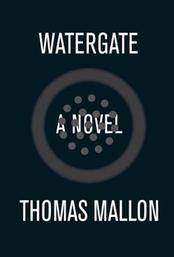
 Their memoirs gather dust on bookshelves, but the scoundrels and victims at the heart of America's worst political scandal come vividly to life in Thomas Mallon's (Dewey Defeats Truman) imaginative re-creation of Watergate, from the bungled break-in at the Democratic National Committee headquarters in the building that gave the scandal its name, through the battle over the Oval Office tapes to Richard Nixon's resignation two years later. Mallon unravels the tangled threads of this well-known chronology, employing multiple points of view--from Howard Hunt and Rose Mary Woods all the way up to Richard Nixon, his characteristic mix of combative self-pity on display--to show how swiftly an administration at the height of its power morphed into a criminal enterprise.
Their memoirs gather dust on bookshelves, but the scoundrels and victims at the heart of America's worst political scandal come vividly to life in Thomas Mallon's (Dewey Defeats Truman) imaginative re-creation of Watergate, from the bungled break-in at the Democratic National Committee headquarters in the building that gave the scandal its name, through the battle over the Oval Office tapes to Richard Nixon's resignation two years later. Mallon unravels the tangled threads of this well-known chronology, employing multiple points of view--from Howard Hunt and Rose Mary Woods all the way up to Richard Nixon, his characteristic mix of combative self-pity on display--to show how swiftly an administration at the height of its power morphed into a criminal enterprise.
At the center of this account of the legal and ethical meltdown is Fred LaRue, a Mississippi businessman and aide to Attorney General John Mitchell who became ensnared in the effort to silence Hunt and the other burglars through generous hush money payments. LaRue's effort to suppress the truth of his mentor's complicity in the coverup mirrors his own fear that a long-buried personal secret may be exposed.
The novel offers intriguing theories to explain some prominent aspects of the story: the motivation for the break-in; the 18 1/2-minute gap in the tape of the meeting where Nixon discussed the burglary for the first time; and his insertion of a jarringly inapt quotation from Theodore Roosevelt in the maudlin farewell speech to his staff on the morning after his resignation. But where a lesser writer might indulge in pure sensationalism, Mallon hews closely to the historical record, all the while attentively conjuring the interior lives of these real-life characters.
Mallon himself concedes Watergate "contains deviations from fact that some readers will regard as unpardonable and others will deem unworthy of notice." Regardless of one's position on that issue, there should be unanimous appreciation for his skill in employing fiction to tell larger truths about a momentous era in American political history. There are moments in Watergate, some of them wickedly funny, that sound more like an episode of The Sopranos than conversations at the highest level of American democracy. Whatever may have motivated the conspiracy, Mallon's well-informed and wise account reminds us of the risk to democracy when a group of powerful people decide that retaining power is their paramount goal. --Harvey Freedenberg
Shelf Talker: An accomplished historical novelist offers a retelling of the scandal that broke Nixon's presidency.

